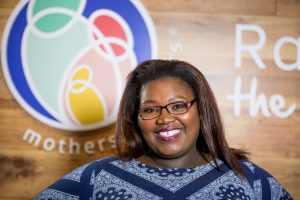Voices from the Frontline: Phumeza Dyantyi
World Health Worker Week (1-7 April) is an opportunity to recognise the vital work that health workers are doing around the world and raise awareness about the challenges they face in delivering services to those in need.
In sub-Saharan Africa, where mothers2mothers (m2m) is based, one of the challenges is a critical shortage of health workers, which leaves many women and families struggling to access vital, lifesaving medical care. The World Health Organization estimates the region is short of 4.2 million healthcare workers, a figure set to rise to 6.1 million by 2030.
m2m bolsters the healthcare system in Africa by training, and employing, local, HIV-positive mothers as community health workers, called Mentor Mothers, who work both at health facilities and door-to-door in the surrounding communities. Since our founding in 2001, m2m has created over 10,000 jobs for HIV-positive women as health workers across sub-Saharan Africa. Together, these women have served more than 10.5 million women and children under two, and have helped to virtually eliminate paediatric AIDS among our enrolled clients for four years in a row.
 We caught up with one of the Mentor Mothers, Phumeza Dyantyi in Khayelitsha, a township near Cape Town, South Africa. Along with four other Mentor Mothers working in the health centre and surrounding community, Phumeza educates and supports adolescent girls and young women, age 15 to 24 years, through m2m’s Youth Alive project. In order to help them make healthy life choices, she shares information about sexual & reproductive health and HIV prevention. She also supports young women living with HIV to access treatment and stay healthy, and ensures that young mothers don’t transmit the virus to their children.
We caught up with one of the Mentor Mothers, Phumeza Dyantyi in Khayelitsha, a township near Cape Town, South Africa. Along with four other Mentor Mothers working in the health centre and surrounding community, Phumeza educates and supports adolescent girls and young women, age 15 to 24 years, through m2m’s Youth Alive project. In order to help them make healthy life choices, she shares information about sexual & reproductive health and HIV prevention. She also supports young women living with HIV to access treatment and stay healthy, and ensures that young mothers don’t transmit the virus to their children.
Why is m2m focusing on adolescents at your health facility?
Statistics show that adolescent girls and young women are more at risk of contracting HIV. They don’t have much information on the importance of HIV testing, condom use, and partner testing. HIV related deaths in this age group are high.
What makes adolescent girls and young women so vulnerable to HIV in your community?
They are not empowered to stand on their own, even though they know what is right and wrong and what is expected of them. Because of peer pressure and poverty, they sleep with older men in exchange for gifts and money. They don’t have much say in those relationships.
Mentor Mothers are there not only to provide health services, but also to educate and support them to have boundaries and know what they want in the future. We also support them to finish school. The main thing is to make sure they have the right knowledge and are empowered enough to stand on their own. Then they can provide for themselves, instead of relying on a man.
Why is it easier for these adolescent girls and young women to express themselves to the Mentor Mothers than a doctor or nurse?
Some doctors and nurses have a tendency to judge adolescent girls and young women. They also don’t have much time to talk to adolescent girls. They are always busy with big numbers of clients. Some clients even leave the clinic after waiting the whole day without receiving health services.
We as the Mentor Mothers are there to support adolescent girls and young women, both before and after they see the clinical staff, and at their own homes. We have been trained to provide services targeted for this group. We live in the same communities and so are familiar, friendly faces. Most importantly, we have overcome similar challenges in our own lives, so we can share our own experiences.
As a result, even if they are not ready to talk, we help them overcome that. We make them smile and laugh so they see that this person will support me. It makes it easy for them to trust us.
How do you use your own story of living with HIV to help your clients?
First of all, I make them understand we are not there to judge but to support them. Newly diagnosed adolescent girls and young women sometimes feel depressed and don’t want to face the world. Having a Mentor Mother share her own story makes it easier. We show them that they can live longer and can get married one day, have dreams of going to varsity, have a meaningful job, achieve all of those things. We serve as role models.
What is message would you like to share this World Health Worker Week?
I’m hoping adolescent girls and young women across South Africa and the whole African continent can access the support of community health workers, like they do here in Khayelitsha, so they can make healthy choices, dream big about their lives, and have a reason to live. I hope they receive the support they need to have principles, boundaries, stay healthy, know what they want, and are empowered enough to stand on their own.
As health workers, we can play our part in making these dreams become a reality, but we need the support of governments, business, and donors. Will you join us?
To read the reflections of another community health worker—Wilbroda Awour Akuro, an m2m Community Mentor Mother in Nairobi, Kenya—click here.






















